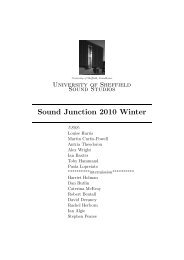Compositional Methods in Electroacoustic Music - Adrian Moore ...
Compositional Methods in Electroacoustic Music - Adrian Moore ...
Compositional Methods in Electroacoustic Music - Adrian Moore ...
You also want an ePaper? Increase the reach of your titles
YUMPU automatically turns print PDFs into web optimized ePapers that Google loves.
This work was orig<strong>in</strong>ally composed from, what were imag<strong>in</strong>ed to be, abstracted materials. However, when<br />
participant responses were analysed and compared it became clear that the notion of the abstracted nature<br />
of sounds differed between the composer and the audience. Detailed knowledge of audiences <strong>in</strong>terpretations<br />
afforded <strong>in</strong>sight <strong>in</strong>to the processes of audience <strong>in</strong>terpretation for works of electroacoustic audio-visual music<br />
and enabled the work to be adapted and clarity of the <strong>in</strong>itial compositional <strong>in</strong>tent re<strong>in</strong>forced.<br />
Paper 4 - Analysis as a support for composition - a community approach.<br />
11:30<br />
Gatt, Michael Emanuel<br />
De Montfort University<br />
For the past year and a half the OREMA (Onl<strong>in</strong>e Repository for <strong>Electroacoustic</strong> Analysis) project<br />
(www.orema.dmu.ac.uk) has been <strong>in</strong> operation allow<strong>in</strong>g users to upload analyses and post topics for discussion<br />
to a wider community of participants. It is an open access <strong>in</strong>itiative that has no limits to the type of<br />
analysis one might submit (provided it is with<strong>in</strong> the scope of the project) or any hierarchical structure, which<br />
facilitates a dialogue between postgraduate students, professors, lecturers and enthusiasts. Through the OREMA<br />
project a model for community engagement towards the advancement of analytical ideas and practices with<strong>in</strong><br />
the doma<strong>in</strong> of electroacoustic music has been def<strong>in</strong>ed. Furthermore, there is the opportunity to expand the<br />
community towards other endeavours, such as compositional techniques and strategies. However, this is not<br />
the only aspect that has been established as part of the project. What has also become apparent is the benefit<br />
of shar<strong>in</strong>g analyses of works by other composers to compare the understand<strong>in</strong>g of the compositional <strong>in</strong>tent<br />
and execution. As composers we look towards others for examples and <strong>in</strong>spiration, hence analysis of other<br />
composers’ works offers a greater <strong>in</strong>sight <strong>in</strong>to their artistry. In this regard analysis becomes a gateway to<br />
composition allow<strong>in</strong>g for composers to share concepts relat<strong>in</strong>g to pieces of <strong>in</strong>terest and <strong>in</strong>fluence. The proposed<br />
paper will aim to dispel the idea that analysis is a separate from composition and that is it <strong>in</strong> fact<br />
a background to greater understand<strong>in</strong>g of our craft. Through develop<strong>in</strong>g community projects that utilise<br />
web 2.0 technology I propose that both analysis and the advancement of compositional techniques could be<br />
achieved through collaboration and shar<strong>in</strong>g on a neutral open access platform.<br />
The presentation will be illustrated with examples from the OREMA website to demonstrate the dynamics<br />
of shared practice. The extension of OREMA to <strong>in</strong>clude a peer reviewed open access journal (eOREMA journal)<br />
has recently been announced. The first issue of the journal is scheduled for an April 2013. eOREMA will<br />
expand the scope of research to encompass issues concern<strong>in</strong>g composition and poietics.<br />
2.3 Concert 1<br />
13:00<br />
Urca Twist<br />
Bentall, Robert David<br />
Queen’s University, Belfast<br />
Urca Twist is a stereo acousmatic work of 20 m<strong>in</strong>utes duration. It is a work that was <strong>in</strong>spired by my 3-month<br />
residency <strong>in</strong> Rio de Janeiro, Brazil. Urca was the neighborhood I rented a flat <strong>in</strong> dur<strong>in</strong>g my stay, which was<br />
an unusually quiet spot, partially due to its hous<strong>in</strong>g of a sizeable military base. However, the rest of Rio was<br />
loud and operated at a blister<strong>in</strong>g pace - bus drivers take dangerous to a new level, and Cariocas seem to rush<br />
everywhere. This is much the opposite of my experience of Belfast, where I live. It is this contrast of pace<br />
between these cities that <strong>in</strong>stilled my desire to explore pac<strong>in</strong>g with<strong>in</strong> an acousmatic work. Pace is <strong>in</strong>herent to<br />
the syntax of the acousmatic but someth<strong>in</strong>g I have only recently taken time to acknowledge. Intense waves<br />
of gestural material dry up to leave resonances hang<strong>in</strong>g for the listener to latch on to before the next sonic<br />
onslaught. Urca Twist was composed <strong>in</strong> the studios of the Federal University of Rio dur<strong>in</strong>g June-July 2012,<br />
and is dedicated to Prof. Rodrigo Velloso who <strong>in</strong>spired me dur<strong>in</strong>g my residency. This work was made possible<br />
by a Santander Mobility Scholarship.<br />
5



